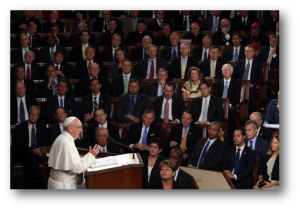By: Wladimir Sarmiento
I have a radical idea: I believe that the government of the United States as a representative democracy has an obligation to represent the American people and their often differing views on a wide gamut of issues, including those that are controversial or social taboos.
While this sounds fairly reasonable, the opinions expressed in this article, in which I will attempt to prove that this ideal has not been reached in the United States of America, will almost certainly make me an unelectable candidate to more than half of voters if I should ever decide to seek political office in this country. This is because the topic of this article is one that is near and dear to many American’s hearts, and that I believe is corrupting the electoral process of this nation: religion.
Our country’s government has always been dominated by people with religious beliefs, as evidenced by a Pew Research Poll this year on the 114th Congress showing that 91.8 percent of members identify themselves as Christians, with only one member lacking religious affiliation.
The problem is that Christians constitute an ever decreasing percentage of the actual US population while numbers of Americans who do not associate with any religion are significantly rising. The same Pew Research Poll shows that only 73 percent of American adults actually identify as Christian, and the percentage of adults that do not associate with any religion has risen from 16.1 to 22.8 percent since 2007. This means that the Congress of this country no longer represents a fifth of the nation in terms of issues pertaining to religion and the teachings of the church.
For better or for worse, religion affects public policy just as much as rich campaign donors and political parties ever will. The debates currently going on about issues like same-sex marriage and the ethics of Planned Parenthood clinics, for example, are inarguably based on differing religious views on both sides. Anyone who disagrees with this is either lying, or worse, vying for a Republican primary nomination.
This is why it is so harmful that there exists a social stigma in this country against openly declaring oneself as lacking religious affiliation (a declaration often interpreted as an admission of being that terrible word, often grouped into the same hateful category as child molesters and murderers: atheist… I shiver at its very mention). Sure, adults are more than willing to do so in the anonymity provided by nationwide polls such as the aforementioned Pew Research ones. But in the inherently public process of running for office, candidates are often pressured into either lying about their religious views or not running at all if they deviate from the established norm. As I alluded in my introduction, a recent Pew study found that over half of Americans say they would not vote for an atheist president; a fact which no doubt deters non-religious candidates from expressing their views truthfully.
So I call for the more-than-one-fifth of you who are reading this article and have no religious affiliation to consider the following the next time you are contemplating voting for a political candidate: Do you want your views to be considered in the government when arbitrating important social issues? If so, it would be wise to put your votes in the few candidates who are brave enough to declare their lack of religious belief, for only then will this country be able to achieve a more accurate representation of its people.












Hola, Wladimir:
Si te he entendido correctamente, lo que tú en realidad estás diciendo es que los ciudadanos estadounidenses que no tienen afiliación religiosa ya están bien representados, pues algunos de esos candidatos no están diciendo la verdad en cuanto a lo que en verdad creen o, más bien, no creen.
Tú mismo dices que los candidatos que no tienen afiliación religiosa no lo están declarando, pero en el fondo de su mente ahí está esa falta de creencias, con lo cual sí estarían repernsentado a quien tampoco cree.
En lugar de hacer un llamamiento a ese quinto del electorado, deberías hacer un llamamiento a los candidatos cobardes y poco honestos.
¡Bendiciones!
Comments are closed.